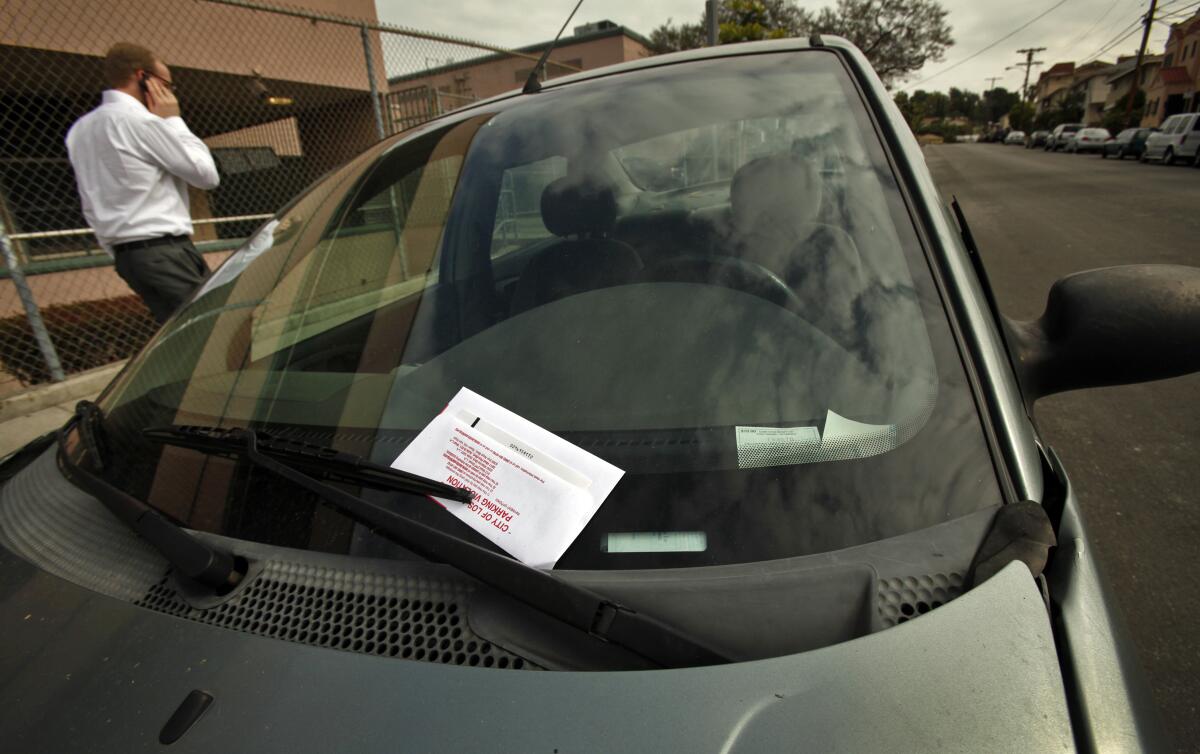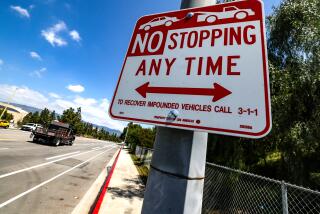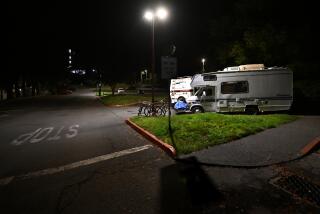Op-Ed: Cancel parking fines for unhoused people who live in their cars

One morning in late April, several unhoused neighbors living in their vehicles off Venice Boulevard awoke to find their windshields marked by the notorious, red-striped envelopes used by the Los Angeles Department of Transportation’s parking enforcement.
The city relaxed its parking restrictions earlier in the pandemic, but a new sign forbidding parking from 10 p.m. to 6 a.m. had recently appeared. Over the next few nights, more tickets appeared. Although some people were able to move their vehicles, others were not because of a combination of inoperability and unease.
I’ve known Kim, 70, for over a year now, having first met her under a nearby overpass where she was sleeping in a tent with her service dog. As a Street Watch L.A. organizer and UCLA doctoral student researching homelessness, I spend a lot of time with unhoused people. It’s clear to me that the city’s parking enforcement policies impose a huge burden on unhoused Angelenos who live in their cars. Rather than punishing these people, the city should focus on systemwide ticket forgiveness for the unhoused.
Parking tickets not only financially penalize the unhoused but also are instruments of displacement. Kim and three of her unhoused neighbors showed me their parking tickets, which altogether totaled $8,845 on three RVs and three cars, half of which display disabled-motorist stickers. These fines undercut one obvious economic reason for owning a vehicle in L.A.: work. Kim, who used to collect recycling on foot with a cart, felt that she “could recycle better” with a car rather than that prior method. Now Kim is at risk of having her car seized because of mounting parking tickets, which if unpaid will prevent her from registering it.
Kim uses her car for work, but she stays with her friend Linda, 65, who moved into an RV in 2019 after losing her Section 8 status and being evicted from her longtime Mid-City apartment (originally her father’s) because the rent increased after a change of ownership. Linda stayed near her old apartment until parking tickets forced her to move to her current location about a year ago. Another forced move would displace Linda and Kim, who are both Black, from their home neighborhoods even as L.A. is trying to reckon with its long history of racial displacement.
There were 6,231 vehicular dwellings with 10,337 occupants in the city of Los Angeles, making up a quarter of the city’s homeless population (41,290), according to the 2020 homeless count, from the Los Angeles Homeless Services Authority. For this population, parking and parking fines are daily problems.
The L.A. Department of Transportation currently runs a program called the Community Assistance Parking Program, which allows unhoused people to perform community service in lieu of paying parking fines. Although the program may ease the financial burden for those who use it, its benefit has been limited because of its various rules and requirements.
As of June 2020, the program, which started in 2017, had been used by 1,070 participants to complete 14,238 community service hours, worth $559,783 in fines converted to community service, according to LADOT. That amount of forgiveness was tiny considering that the agency generated about $115 million from 1.3 million parking citations in 2020. In effect, programs like CAPP allow LADOT to take credit for building an “equitable parking program” while not changing much to end the problem. With the homeless population expected to grow, in part because of an eviction crisis, the city needs a more comprehensive program for parking citation forgiveness for the population who live in their cars.
So what could replace CAPP? Since CAPP already requires unhoused people to register through a caseworker, a similar process could be used to clear parking tickets — without community service. This could present an opportunity for caseworkers to connect with unhoused people, who are incorrectly labeled as “service resistant,” and form relationships around better services.
Further, just as caseworkers hand out vouchers to cover fees for the Department of Motor Vehicles, they could also provide parking vouchers that notify parking enforcement officers that a vehicle is being used as shelter. There may even be a shortcut to ticket cancellation: by cross-referencing vehicle registration data from the DMV with data on unhoused status from the city’s homelessness management information system, LADOT could identify which tickets belong to unhoused people and forgive them en masse.
As the city reviews its budgetary priorities and tries to fix its patchwork homelessness services system, it should rethink parking enforcement on unhoused people and poor people generally. A policy to cancel parking fines for people whose shelter is their car is a good place to begin.
Sam Lutzker is a doctoral student in sociology at UCLA and an organizer with Street Watch L.A. @SamLutzker
More to Read
A cure for the common opinion
Get thought-provoking perspectives with our weekly newsletter.
You may occasionally receive promotional content from the Los Angeles Times.






